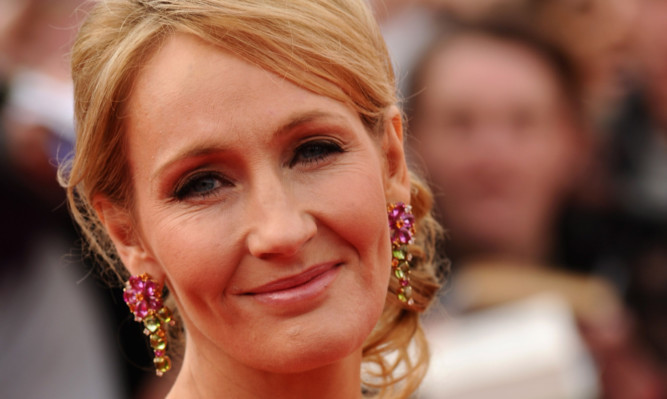When Harry Potter author JK Rowling expresses an opinion on anything it makes headline news, so it was inevitable that an innocent comment she made about the SNP would become a story in itself.
She was responding to claims made in a Scottish newspaper last week that ‘any trace of ethnic nationalism, and anti-English sentiment, was expunged from the (SNP) in the 1970s’.
JK, English born but living in Scotland, said this was ‘quite a claim’ and asked “how many English incomers were polled before the making of that confident assertion?”
Obviously, she wasn’t. A donor to the Better Together campaign before last year’s independence referendum, she became a high profile target of the cybernats.
Most of the online vitriol directed at her is far too fruity for a family paper, but suffice to say she was challenged over her English identity.
She has since been called a traitor to Scotland and urged to leave the country after speaking out about the abuse she gets from Scottish nationalists, so without delving too deep into her inbox, it is fair to say she has a point.
While the majority of separatists in this country would surely embrace their neighbour, regardless of birthplace, skin colour, accent, religious or political persuasion, there does sadly remain a well of prejudice within their party.
I would hesitate to call this racist because the English are not ethnically different from the Scots, or from the Welsh for that matter, and so long as we all call ourselves British we cannot be foreigners to each other.
But anti-English sentiment pervades parts of the Scottish secessionist psyche so profoundly they hardly notice it themselves.
Blatantly anti-English
Unlike JK, I tend not to read online comments and have no Twitter account, so I don’t know if I have been attacked for being an incomer, which I am.
But listen to this, a letter published on these pages a few months ago:
“It is interesting that she (that’s me) has yet to comment on your report of March 27 on the in-depth findings of academic research in the aftermath of the referendum. The most crucial fact found was that had only Scottish-born voters participated, then there would have been a 53% vote in favour of independence.”
Now, this is about as blatantly anti-English as it is possible to be without telling me to ‘go home’. Imagine if a letter writer to a London-based newspaper talked about English born voters as if their votes alone should be counted.
There are two levels at which those Scottish nationalists who are anti-English a minority I am certain express their intolerance.
There is the tearing down of Union flags and the naked aggression that sullied the referendum in September.
A couple from Yorkshire, Alison and Ken Porter, decided in the wake of the independence vote to go back to England after their home on the outskirts of Stirling was vandalised and they were accused by locals of ‘stealing jobs’.
“It’s got to the point where I feel afraid to talk because I have a Yorkshire accent. In any other context, you’d call it racism,” Mrs Porter said at the time. When Jim Murphy, a Scot, campaigned for the No camp he was routinely savaged for “siding with the English Tories”.
And Nigel Farage was told to ‘go home to England’ by nationalists protesting, ironically, against his ‘racism’.
Worse in a way was when Vicky Featherstone, the former head of Scotland’s National Theatre, returned to England three years ago, branded a ‘colonist’ by one of Scotland’s most esteemed cultural icons, Alasdair Gray.
She later said anti-English bullying had almost forced her out sooner. Critics had used her nationality against her when questioning her work and accusing her of ignoring traditional Scottish plays.
She said: “It really upset me because, as with all kinds of bullying, you don’t have a voice so the hardest thing for me was that if people had criticised the programme, I could have defended it, but when people are criticising the programme because I am English, that is indefensible.”
Asset to Scotland
Vicky was baited not by mindless thugs but by a theatre going elite who would probably abhor xenophobia if aimed at any nationality other than the English.
Yet she set up our National Theatre and brought plays such as the acclaimed Black Watch to worldwide audiences. Like JK whose donation to unionists pales beside her gifts to Scottish charities and the millions she puts back into the country in taxes the theatre director was nothing but an asset to Scotland, a country small enough to need new blood from wherever we can get it.
The SNP recognises this but it has a lot more expunging to do before it eradicates all traces of prejudice from its supporters.
